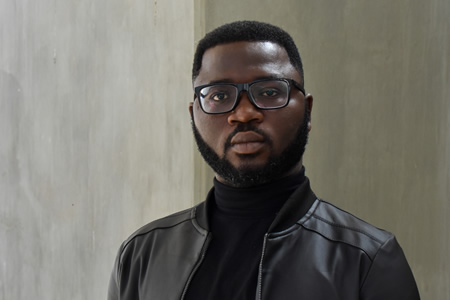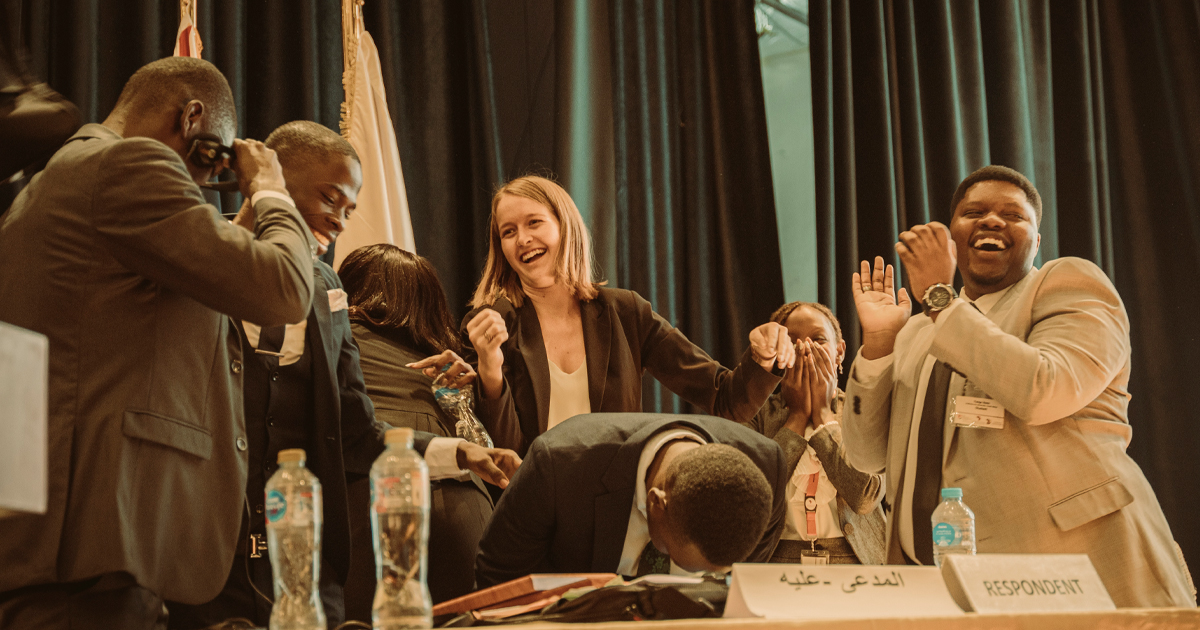The British University in Egypt hosted the 31st edition of the African Human Rights Moot Court Competition in Cairo, from 25 - 30 July 2022. In commemoration of the human rights champion, founder of the African moot competition and former United Nations (UN) special rapporteur extrajudicial executions, Prof Christof Henys.
The preliminary rounds began on 26 July 2022, where 32 anglophone, six francophone, four arabophone and two lusophone teams argued on both sides of the hypothetical case. The quarterfinals and semi-finals for anflophone and francophone teams were held on 27 July 2022 to identify the finalists in those two language categories. For the first time in the history of the African Human Rights Moot Court Competition, preliminary rounds took place in four languages namely: Arabic, English, French and Portuguese. The five anglophone teams that advanced from the semi-finals were: Kenyatta University (Kenya), Stellenbosch University (South Africa), Kwame Nkrumah University of Science and Technology (Ghana), the British University in Egypt and Makerere University (Uganda). Université Felix Houphouet-Boigny de Cocody (Côte d’Ivoire) emerged as the top team in the francophone stream, while Universidade Jean Piaget (Angola) and University of Khartoum prevailed in the Portuguese and Arabic streams.
Competition
What makes the Christof Heyns African human rights moot court competition unique, the collaborative endeavour to challenge teams to work together beyond the colonial language divides and legal traditions. Finalists are paired into two combined teams with one combined team arguing the applicant’s case and the other the respondent State’s case. The British University in Egypt, University of Khartoum, Kenyatta University and Universidade Jean Piaget formed the combined team that represented the Applicant. Stellenbosch University, Kwame Nkrumah University of Science and Technology, Makerere University and Université Felix Houphouet-Boigny de Cocody argued on behalf of the respondent. The respondent team emerged as the overall winners of the 31st edition of the moot. The proceedings of the final round were interpreted into the four competition languages.

Tel: +27 (0) 12 420 3151
Fax: +27 (0) 86 580 5743
ayodele.sogunro@up.ac.za
Panel of Judges
Teams appeared before a bench of five eminent jurists. Hon. Justice Blaise Tchikaya, Vice President of the African Court on Human and Peoples’ Rights chaired the bench, with Prof Maya Fadel-Sahli (Vice Chairperson of the African Commission on Human and Peoples’ Rights), Judge Dr Ferh Emara (President of the Economic Court of Appeal of Egypt), Ms Diana Asonaba (Deputy Minister of Justice and Deputy Attorney General of Ghana) and Mr Clàudio Foquiço (Attorney and Vice President of Human Rights Commission of the Bar Association of Mozambique) making up the rest of the bench.
The Centre for Human Rights co-organised the event with the British University in Egypt. The director of the Centre, Prof Frans Viljoen, commended the hosts on the very successful hosting of the competition and that the hosts exceeded expectations by providing detailed care and attention to all participants.’ He also thanked and congratulated the Centre team, led by project coordinator Sayaad Yusuf.
Preliminary Rounds Results Teams Ranking
English-speaking Teams (top 20)
- Kwame Nkrumah University of Science and Technology, Kumasi, Ghana
- Kenyatta University, Kenya
- University of Ghana, Legon, Ghana
- Cavendish University, Uganda
- Stellenbosch University, South Africa
- The British University in Egypt, Egypt
- University of the Western Cape, South Africa
- Uganda Christian University, Uganda
- University of Pretoria, South Africa
- University of Johannesburg, South Africa
- University of Nairobi Kenya
- University of the Witwatersrand, South Africa
- University of Cape Town, South Africa
- Makerere University, Uganda
- University of Lusaka Zambia
- Nelson Mandela University, South Africa
- University of Malawi, Malawi
- University of the North West, South Africa
- Kabarak University, Kenya
- Ghana Institute of Management and Public Administration, Ghana
*The top 16 advanced to the quarterfinals.
French-speaking Teams (Top 4)
- Université Felix Houphouet-Boigny de Cocody-Abidjan (Côte d’Ivoire)
- Institut Universitaire d'Abidjan (Côte d’Ivoire)
- Université Thomas Sankara (Burkina Faso)
- Université Catholique de Bukavu (République Démocratique du Congo)
*The top 2 advanced to the semifinals
Portuguese-speaking teams
- Universidade Jean Piaget de Angola (Angola)
- Instituto Superior de Ciencias e Tecnologia de Moçambique (Mozambique)
Arabic-speaking teams
- University of Khartoum (Sudan)
- Cairo University (Egypt)
- Helwan University (Egypt)
- Minia University (Egypt)
Memorials Ranking
English-speaking teams
- Kwame Nkrumah University of Science and Technology
- Stellenbosch University
- Lagos State University
- University of Ghana, Legon
- Kenyatta University
- The British University in Egypt
- University of Botswana
- Dilla University Ethiopia
- Cavendish University
- Makerere University
- University of the North West
- University of Nairobi
- University of Pretoria
- University of Cape Town
- Ghana Institute of Management and Public Administration
- University of the Western Cape
- University of Lusaka
- University of Johannesburg
- Tshwane University of Technology
- University of Malawi
French-speaking teams
- Universite Nazi Boni
- Université Felix Houphouet-Boigny de Cocody-Abidjan
- Université Thomas Sankara
Portuguese-speaking teams
- Instituto Superior de Ciencias e Tecnologia de Mocambique
- Universidade Jean Piaget de Angola
Arabic-speaking teams
- University of Khartoum
- Cairo University
- Helwan University
- Minia University
Oralists Ranking
English-speakers (Top 20)
- Afia Owusuwaa Banahene ( Kwame Nkrumah University of Science and Technology)
- Anita Enyonam Dei (Kwame Nkrumah University of Science and Technology)
- Mitchel Namalwa Kakai (Kenyatta University)
- Kwabena Amankwaah Addae-Marfo Addae-Marfo (University of Ghana, Legon)
- Oola Alvin Kubasu Kubasu (Kenyatta University)
- Blessed Atwine Mugisha Atwine (Cavendish University)
- Yanga Keva (Stellenbosch University)
- Winnie George (University of Johannesburg)
- Leila Mohamed (The British University in Egypt)
- Nicholas Najuna Nicholas (Cavendish University )
- Prisca Amponsah Amponsah(University of Ghana, Legon)
- Adam Darren Ferguson (University of the Western Cape)
- Khanyisile Ndaba (University of the Witwatersrand )
- Rehema Namuli Babirye (Uganda Christian University)
- Kudzaishe Mukunga (University of Cape Town)
- Claudio Junior Faro (University of Zimbabwe)
- Mamkhabela Mthembu (University of Pretoria )
- June Anindo (University of Nairobi)
- Francis Byaruhanga (Uganda Christian University)
- Nyeleti Precious Mabunda (University of the Western Cape )
*from a total of 64 oralists
French-speakers (Top 6)
- Dayoro YanneMartial (Institut Universitaire d’Abidjan)
- Jean Crastes-Armel Ouokapeu (Université Félix Houphouët-Boigny de Cocody)
- Anciza Migan Ryan (Université Catholique de Bukavu)
- Koffi Jean Joël Euloge (Université Félix Houphouët-Boigny de Cocody)
- Aitchedji Selome Sigsmind Rachid (Université Thomas Sankara)
- Coulibaly Nabintou Irmine Ashley (Institut Universitaire d’Abidjan)
Portuguese speakers (top 2)
- Mambuco Gimbi Alberto(Universidade Jean Piaget de Angola)
- Sandango Jose Diana(Universidade Jean Piaget de Angola)
Arabic-speakers (top 4)
- Ahmed Mahmoud Abdelrahim (University of Khartoum)
- Aman Saria Mamoun Mubarak (University of Khartoum)
- Abouzeid Sara Nadi Ali (Cairo University )
- Awad Kareem Ibrahim Kamel (Cairo University)
Final round results
The five anglophone teams that advanced from the semi-finals were: Kenyatta University (Kenya), Stellenbosch University (South Africa), Kwame Nkrumah University of Science and Technology (Ghana), the British University in Egypt and Makerere University (Uganda). Université Felix Houphouet-Boigny de Cocody (Côte d’Ivoire) emerged as the top team in the francophone stream, while Universidade Jean Piaget (Angola) and University of Khartoum prevailed in the Portuguese and Arabic streams respectively.
In the spirit to challenge the teams to work together beyond the colonial language divides and legal traditions, the finalists are paired into two combined teams with one combined team arguing the applicant’s case and the other the respondent State’s case.
Composition of combined teams in the final
Applicant:
- The British University in Egypt
- University of Khartoum
- Kenyatta University
- Universidade Jean Piaget
Respondent:
- Stellenbosch University,
- Kwame Nkrumah University of Science and Technology
- Makerere University
- Université Felix Houphouet-Boigny de Cocody
The respondent team emerged as the overall winner of the 31st edition of the Christof Heyns African Human Rights Moot Court Competition.
Supporting partners
The Centre for Human Rights and the British University in Eygpt, acknowledge and thank the funding partners for the 2022 Christof Hyens African Moot Competition: the European Union (as part of its support to the Global Campus of Human Rights), Raoul Wallenberg Institute, British University in Eygpt, and the University of Pretoria (through the Centre for Human Rights)
From Cairo back to Ghana in 2023
The 32nd edition of the Christof Heyns African Human Rights Moot Court Competition will be hosted by Kwame Nkrumah University of Science and Technology in Kumasi, Ghana in September 2023.


